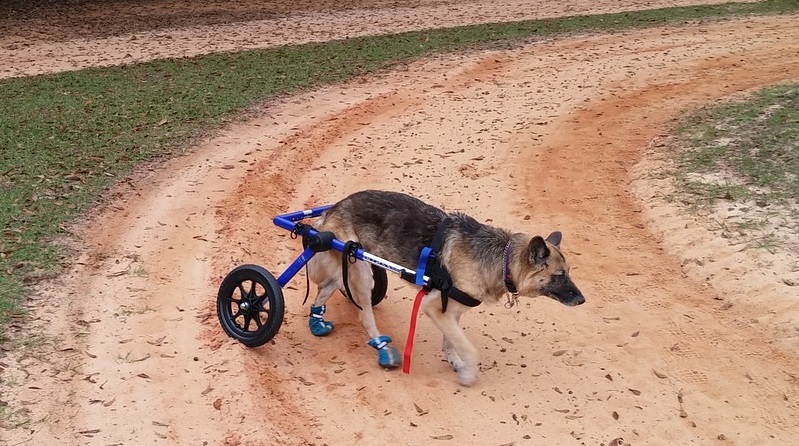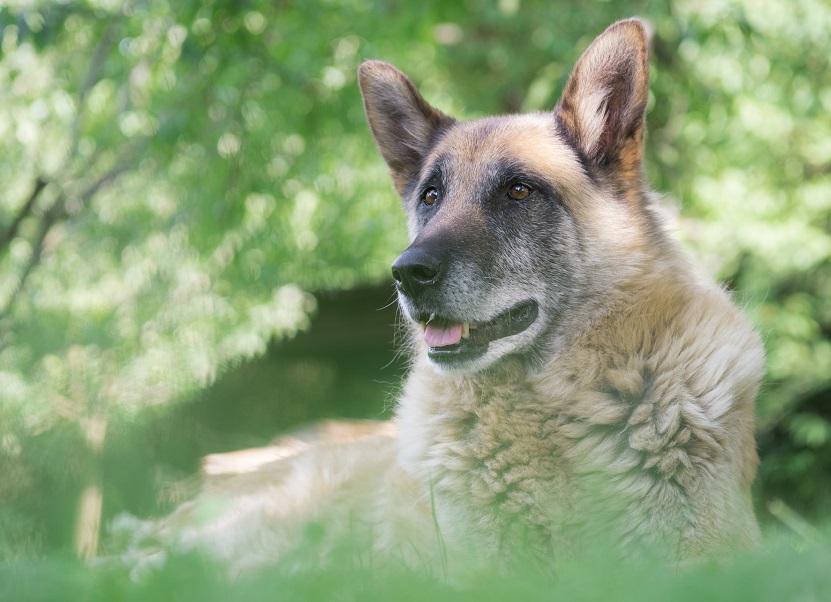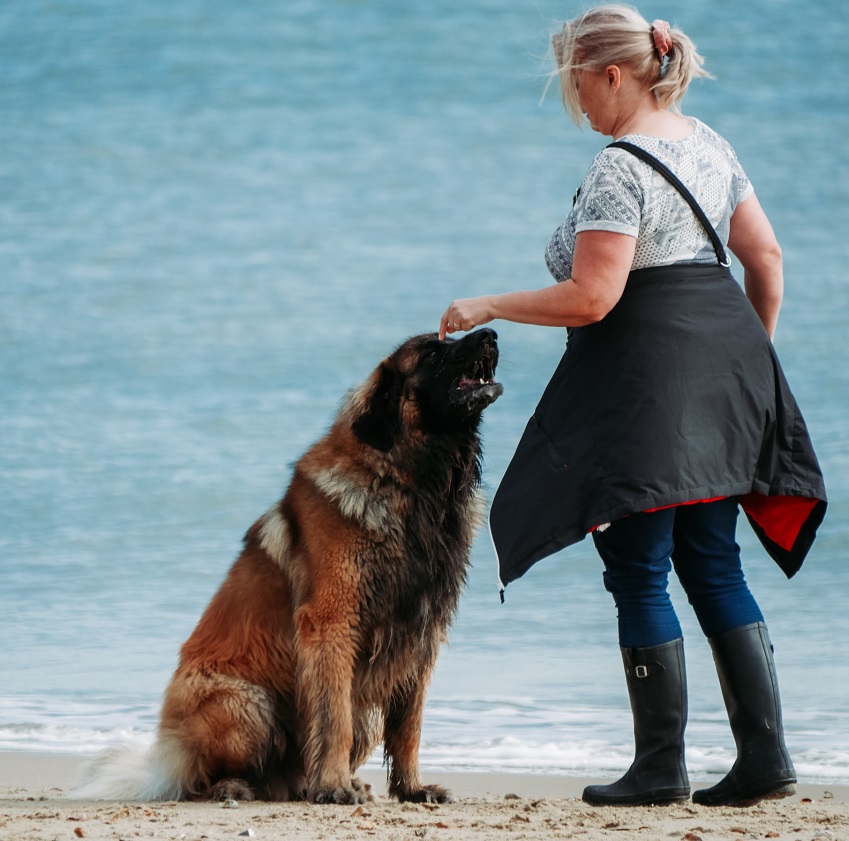How to Care for an Aging German Shepherd
Most German Shepherds enjoy comfortable lives, are treated well and get plenty of exercise, but they rarely live longer than 13 years. Dogs have much shorter lifespans than human beings, and large breeds like German Shepherds are considered elderly at about eight years of age. There will not be a single sign to tell you that your dog has reached its golden years, but here are a few things you can look out for:
- Lethargy: Dogs and people tend to slow down as they get older. If going for a walk does not get your dog as excited as it once did, it may be time to slow things down a little.
- Weight gain: If your dog is not eating as much or eating the same amount and putting on weight, it could be because they are not exercising as much and burning up as many calories.
- Fading eyesight: Vision problems are common in older dogs, and they sometimes make senior German Shepherds reluctant to go outside. The world can seem like a scary place to a dog, and this is especially true when they can no longer identify the source of a loud noise quickly.
- Aches and pains: Older dogs need more time to recover from strenuous activities and may show signs of stiffness for several days.

Proactive Steps to add Years to your German Shepherd’s Life
While old age and decline may be inevitable for all living things, there are steps you can take that could add years of health and enjoyment to your dog’s life.
Select a Breeder Carefully
German Shepherds make loyal, intelligent and affectionate family pets, but the breed is predisposed to about 50 hereditary diseases. Breeders are aware of this, and most of them take great steps to ensure that the puppies they sell will lead long and healthy lives. Most of the problems people encounter with older German Shepherds could have been avoided if they looked for breeders that answered their questions candidly and really cared about their dogs. Regis Regal has been breeding German Shepherds for decades and is an American Kennel Club Breeder of Merit, and all of our puppies come with a lifetime health guarantee.
Choose Nutritious Dog Food
The food you give to your German Shepherd will provide it with far more than energy. Pet food high in vitamins, minerals, trace elements and phytonutrients can improve organ function and delay the development of degenerative diseases, but how can you tell the good from the bad? One of the first things you should do is read the label.
This is because the Association of American Feed Control Officials has developed standards for pet food labelling that can provide you with useful clues. Look for products that contain “meat” and “poultry” rather than “meat by-products” or “poultry meal,” and keep an eye out for preservatives like butylated hydroxytoluene, benzoic acid and ethoxyquin.
Make Exercise a Priority
Dogs that get plenty of exercise live longer and happier lives. In addition to building strength and stamina, regular play and exercise can help dogs to adapt to new situations and develop their social skills. Exercise will generally become less vigorous as a dog ages, but it should always remain a part of their daily routine.


Visit the Vet Regularly
The early signs of a serious health condition are sometimes easy to overlook, and this is particularly true when the patient cannot tell you where it hurts. Regular visits to the vet can catch problems early when more treatment options are available, and they could save you money in the long run.
Make Time for Love
Many older dogs spend most of their time sleeping or just lazing around, but that does not mean they want to be left alone. Your senior German Shepherd may no longer have the energy to pester you for affection the way they once did, but they will still appreciate all of the hugs and belly rubs you can spare. Having affection lavished on them also reminds an older dog that they still have a special place in their owner’s heart.
Caring for an Elderly German Shepherd
Taking care of an elderly dog can be emotionally draining, but dealing with the reality of the situation and taking appropriate action can make coping easier. To ensure that your German Shepherd enjoys its golden years, you will probably have to make some changes to its diet, health care and exercise routine.


Elderly German Shepherd Exercise
Long walks are probably the best way to keep your older German Shepherd as healthy as possible. The walks may be a little slower and recovering could take longer, but your dog will still get plenty of exercise and have lots of fun.
Try to avoid activities that involve jumping as they could cause shoulder or hip injuries, and encourage your German Shepherd to take to the water as swimming is an excellent way to maintain muscle mass without placing stress on joints.
If your German Shepherd is reluctant to go for a walk, you may want to make an appointment with the vet to make sure that their hesitancy is not being caused by an underlying medical condition.
Elderly German Shepherd Nutrition
Dogs become less active as they age, which means that they need less food. A few extra pounds can make it painful for a dog with aging bones to move around, so you should monitor your German Shepherd’s food intake carefully to avoid unnecessary weight gain.
You could also choose special pet food formulations for senior dogs that have fewer calories and ingredients designed to boost immune systems and lubricate joints. There are also herbal remedies like Yunnan Baiyao that could help older dogs to deal with soreness and recover from injuries more quickly.
Elderly German Shepherd Health Care
Your trips to the vet with an elderly German Shepherd will serve two purposes. The vet will take blood samples and run tests to diagnose any developing health issues, and they will also help your dog to cope with issues it is already facing. It is a good idea to keep a record of any unusual behavior that could help your vet to get to the root of a problem.
Your vet may also recommend support devices like hip braces or padding if your German Shepherd is showing signs of joint problems. Another gift that your dog will definitely appreciate is a ramp or set of steps that it could use to make getting into your car or reaching its favorite resting place just a little easier.
Accept and Love Your German Shepherd at Any Age
Dog owners know that getting a puppy is the first step on an incredible journey, but they also understand that the journey is a short one. Taking care of an older dog gives us the opportunity repay years of loyalty and love, and it can also help us to prepare for the inevitable.
If you want to bring a German Shepherd into your life and are willing to accept the responsibilities of dog ownership, the experts at Regis Regal can help you to find the perfect puppy and answer any questions you have. To find out more about our health guarantee, follow-up services and training programs, you can call us on (847) 741-1908 or fill out our online contact form.
